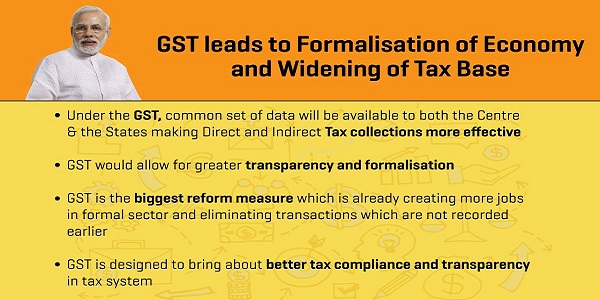There are early signs of tax base expansion. Between June and July 2017, 6.6 lakh new agents, previously outside the tax net, sought GST registration. This is expected to rise consistently as the incentives for formalization increase. Entire Textile chain is now brought under tax net. Further, a segment of land and real estate transactions has also been brought into tax net “works contracts”, referring to housing that is being built. This in turn would allow for greater transparency and formalization of cement, steel and other sales which earlier tended to be outside the tax net. The formalization will occur because builder will need documentation of these input purchases to claim tax credit.

The introduction of GST, a common Indirect Tax for both the States as well as the Central Government with its end to end digitization of all processes, is the biggest reform measure which is already creating more jobs in formal sector and eliminating transactions which are not recorded earlier in the books of accounts and thus, were outside the tax net so far. GST is designed to bring about better tax compliance and transparency in tax system. It is putting a premium on honesty. It would make increasingly difficult for those (who are liable to pay tax) to remain outside the tax net.
A number of procedural changes have also been made since the roll-out of GST on 1st July, 2017 in order to simplify the processes. An extensive exercise was undertaken for tax payers education and facilitation by way of knowledge sharing, dissemination of information and replies to FAQs among others. Further, steps are also being undertaken for further simplification in order to facilitate the tax payers and to extend benefit to the customers.
******




